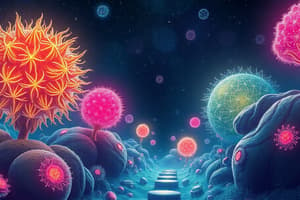Podcast
Questions and Answers
Which of the following accurately characterizes the relationship between protists and eukaryotes?
Which of the following accurately characterizes the relationship between protists and eukaryotes?
- Protists exclusively include multicellular organisms.
- Protists and eukaryotes are two distinct domains.
- All eukaryotes share a common ancestor with protists. (correct)
- Protists are a subgroup of Archaea.
In the tree of life, which group is included under the clade Sarcopterygii?
In the tree of life, which group is included under the clade Sarcopterygii?
- Green Algae
- Cnidarians
- Octopuses
- Coelacanth (correct)
What is the correct classification of jawed fishes as per the provided content?
What is the correct classification of jawed fishes as per the provided content?
- They represent a subgroup within Cnidarians.
- They are classified as Deuterostomes. (correct)
- They fall under the category of Echinoderms.
- They belong to the clade Protostomes.
Which of the following groups is not included under the clade Vertebrates?
Which of the following groups is not included under the clade Vertebrates?
Which of the following correctly identifies a group that is part of the clade Amniota?
Which of the following correctly identifies a group that is part of the clade Amniota?
Which group is not typically classified under the domain Eukarya?
Which group is not typically classified under the domain Eukarya?
What is a defining feature of the clade Opisthokonts?
What is a defining feature of the clade Opisthokonts?
Which category best defines the lineage of Green Algae according to the content provided?
Which category best defines the lineage of Green Algae according to the content provided?
Which of the following organisms falls under the category of Bilaterians?
Which of the following organisms falls under the category of Bilaterians?
In the classification of life forms, which group is characterized by having a backbone?
In the classification of life forms, which group is characterized by having a backbone?
Flashcards are hidden until you start studying
Study Notes
Eukarya and Protists
- The protists belong to the Eukarya domain, consisting of various eukaryotic organisms.
- Common ancestor of protists is the eukaryotes, distinguishing them from other domains.
Tree of Life Overview
- Vertebrates are categorized under deuterostomes and bilaterians, showcasing the evolutionary lineage of animals.
- Sub-category Opisthokonts includes multiple significant groups leading to complex life forms.
Major Clades under Vertebrates
- Sarcopterygii: Lobe-finned fishes leading to tetrapods.
- Tetrapoda: Emphasizes the transition from aquatic to terrestrial life.
- Amniota: Grouping that includes reptiles, birds, and mammals, showcasing evolutionary adaptations.
- Reptilia: Diverse group comprising crocodilians, birds (Aves), turtles (Testudines), and lizards/snake.
- Great Apes: Encompasses modern humans (Homo sapiens), chimpanzees, and unique species like the duck-billed platypus.
- Mammalia: Diverse class including amphibians, lungfish, and ancient lineages like coelacanths.
- Amniota: Grouping that includes reptiles, birds, and mammals, showcasing evolutionary adaptations.
Protostomes and Other Life Forms
- Protostomes: Include several major groups like echinoderms (starfish), cephalopods (octopuses), and simpler organisms like sponges and cnidarians.
- Fungi and various protist groups (Amoebozoans, Stramenophiles) reveal early evolutionary forms and diversity.
Plant Lineage
- Angiosperms and Gymnosperms showcase the evolution of flowering and non-flowering plants.
- Green Algae: Includes stoneworts and chlorophytes, highlighting the diversity and evolutionary significance of aquatic plants.
- Red algae and other protist classifications (Rhizaria, Discoba) illustrate the complexity of photosynthetic life.
Microbial Life
- Archaea: Includes specific clades like Asgard and DPANN, representing early branching groups of life.
- Bacteria: Encompass major groups like proteobacteria and cyanobacteria, foundational to life on Earth.
Plants and Green Lineage
- Land Plants: The evolution of green plants, particularly within the Plantae group, marks significant adaptations for terrestrial environments.
- The classification into vascular plants and seed plants illustrates important evolutionary milestones in plant development.
Studying That Suits You
Use AI to generate personalized quizzes and flashcards to suit your learning preferences.




